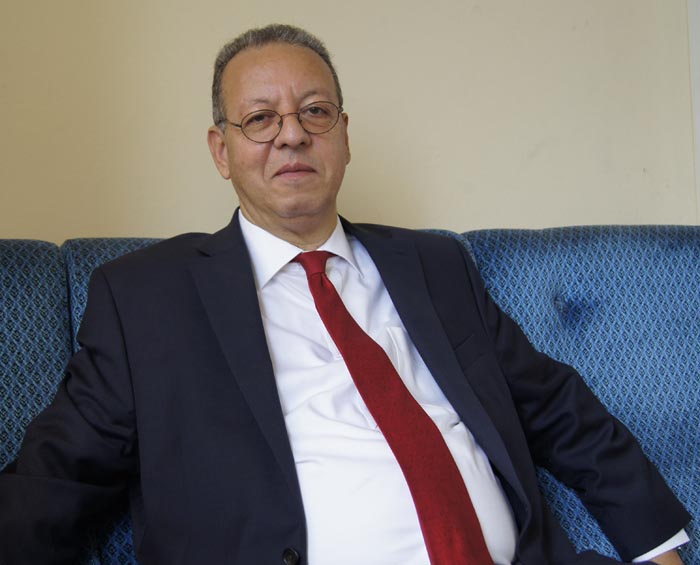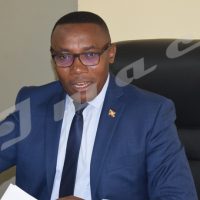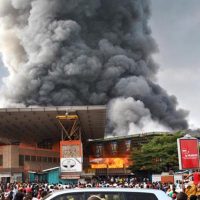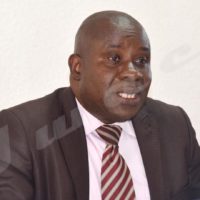During his visit to Bujumbura, Special Adviser to the Secretary-General Jamal Benomar gave an exclusive interview to Iwacu. He explains the objective of his trip and shares his views on the current situation in Burundi.

Jamal Benomar
The Security Council has tasked you to consult with the Government on Resolution 2303. What conclusions have been reached so far?
Firstly, let me clarify that I am the Special Adviser to the United Nations Secretary-General, and as such, I’m in Burundi to deploy the good offices of the Secretary-General. The Security Council, which supports our mandate to help the Burundians find a peaceful resolution to the current political crisis, asked me on this visit to explore with the Government ways in which to implement resolution 2303, which we are doing in a consensual manner and with respect to the sovereignty of Burundi. The discussions we’ve had so far are encouraging, and will continue. I will brief the Security Council on the outcome of these discussions shortly.
Speaking of this mission, you yourself spoke of “crisis talks”. Why?
I don’t recall ever having used that expression. What I have said and what I continue to reiterate is that what began as a political crisis can only be resolved by a political solution. That means that Burundians have to sit around the same table, discuss openly and willingly the issues at hand and try to find a compromise that will allow the situation to normalise. Each party will have to make concessions and no one stakeholder will be able to impose their vision on others. The interests of Burundi and the Burundian people must come first.
Members of the international community will come and go, but Burundi is here to stay. Burundians should be able to find a solution. It is they who will live with the consequences of their actions in the years to come.
The Government has just taken radical measures including withdrawal from the ICC and the suspension of collaboration with OHCHR. What do you take from that?
These steps are clearly going to send a negative message to those who are sincerely trying to help Burundi. But what it really shows is that there is a great deal of misunderstanding between the Government and the international community. That’s because there is a lack of trust, and that needs to be fixed. How? By all stakeholders rejecting violence; committing to inclusive and genuine talks; making sure the rights and freedoms of Burundians are protected and promoted. Burundi, as a free and sovereign country, should be helped rather than lectured. But it does have commitments that need to be honoured.
Many reports on Burundi describe such a terrible human rights situation that some think the Security Council should invoke Chapter 7. Do you think that’s a possibility?
Only the Security Council can judge whether the situation in Burundi requires Chapter 7. I am the special adviser to the Secretary-General, and as such I do not subscribe to a logic of coercion or imposition. That said, let me share my personal view on this question, after 25 years of experience with the UN. Chapter 7 has never worked as a panacea for countries in conflict. Look at Afghanistan, Iraq, Libya, among others…
Chapter 7 is what happens when we’ve reached the point of no return. For Burundi, I am convinced that, while in some respects the situation remains serious, a peaceful way forward is still possible. The security situation has improved on the whole compared with a few months ago, but with no political solution, I’m not sure that it is sustainable.
The Burundians need to show leadership and take ownership of their future. They must no longer count on the outside world to resolve their problems and neither see it as the cause of all their troubles. The Burundians need to find a way of discussing among themselves without outside interference, which is only ever motivated by the protection of interests. The region and the international community can certainly play a supportive role, but it’s for the Burundians to take centre stage.
What chance do you give the internal and/or external Burundian dialogue in terms of resolving the crisis?
Dialogue is still the most effective way for Burundi to return to peace and stability and find a way forward for a better future. Again, that dialogue must be genuine and inclusive. Unfortunately the internal dialogue is perceived as not meeting all expectations and not including all stakeholders either. As a result, its findings will be seen by some Burundians as lacking credibility and subsequently will be challenged. As for the external dialogue, it is struggling to get off the ground, despite the determined efforts of the facilitator, President Mkapa, who we stand behind and support.
As I said, it’s up to the Burundians to take charge of their affairs and decide on how to move forward in order to resolve the crisis. And the international community must support them in their choice. It is the Government’s responsibility to initiate confidence building measures and to create a conducive environment for an inclusive dialogue.
If the Government maintains its current stance, what future is there in terms of collaboration with the UN?
The UN will never abandon the Burundian people, I can guarantee that. While other partners have reduced or frozen certain parts of their assistance in reaction to the crisis, the UN has strengthened its presence and its work in helping the Burundian people.
We are not here to only help political stakeholders with their differences. The UN’s presence here is both comprehensive and consistent. The various UN agencies have worked and continue to work tirelessly to help suffering refugees and the internally displaced, to immunise children against illnesses and ensure they get better schooling, to promote and protect human rights, advocate gender equality, advise on sustainable development and health,etc. In short, the UN works on many fronts in accompanying the Burundian people in their endeavour for a better future.
We are proud of what we have achieved but we are also aware of the tremendous needs that still need to be met. That’s why I gathered the whole UN family while I was here, to discuss ways in which we can bring more support to the Burundian people.
So as the UN continues to work closely with all willing stakeholders, particularly the government, to find a consensual resolution to the political crisis, so will it seek to strengthen its presence and efforts on the ground to better help the Burundian population.
Burundi has UN and AU peacekeepers. As the AU considers sending Burundians home from Somalia, what about UN peacekeepers?
There’s no point in speculating on the matter here. But I would like to pay homage to the Burundian troops and acknowledge the sacrifices they have made to peacekeeping in many countries, particularly in the Central African Republic and Somalia. I think their role is indispensable and the international community must acknowledge that.
Today, we must reflect on the role of Burundian peacekeepers. How did a country devastated by a decade of civil war become — just a few years after finding its own peace and stability– an indispensable force for peace and security on the African continent? What’s stopping Burundi from doing the same again? I’m convinced that with leadership and political will, Burundi will return to its rightful place on the international stage.
After Burundi and South Africa, the Gambia has also decided to leave the ICC. Doesn’t that signal a disavowal of the UN’s capacity to resolve issues related to the rule of law and human rights in states where these principles are violated?
I can only echo the Secretary-General in urging these countries to reconsider. Members of the ICC have the right to criticise the way in which it functions and how international justice is administered. But they shouldn’t lose view of the sad reality behind the creation of the Court. In many places in the world grave violations of human rights, including war crimes and crimes against humanity, continue to be committed with complete impunity. It’s intolerable! It’s important to remember too that the ICC is a last resort in the course of justice. If countries adopt laws, determine policies and procedures and establish institutions that ensure a sustainable and effective protection of human rights, the ICC should not be required to intervene.



















 IWACU Open Data
IWACU Open Data

